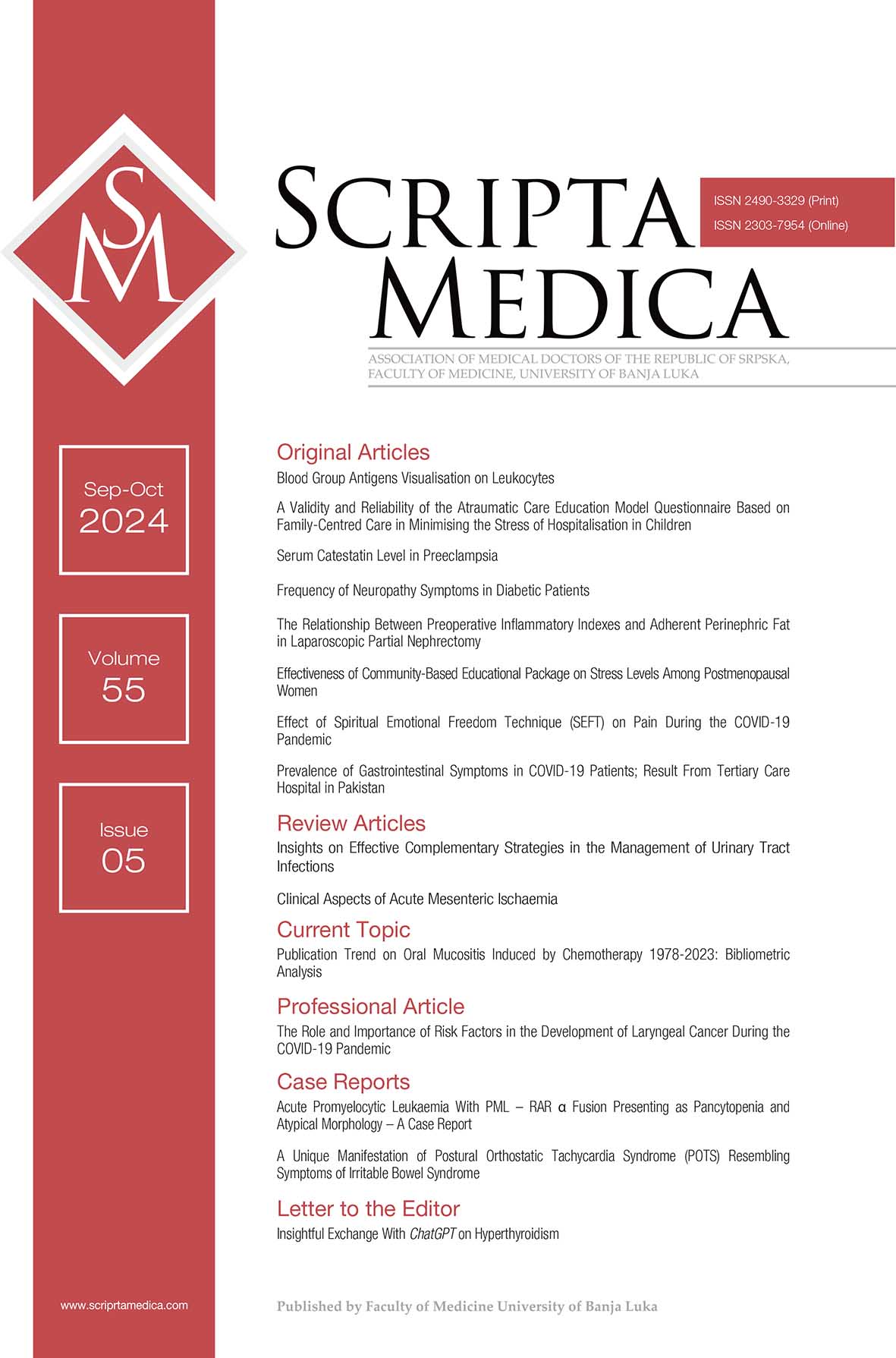The Role and Importance of Risk Factors in the Development of Laryngeal Cancer During the COVID-19 Pandemic
Abstract
Background/Aim: Laryngeal cancer is one of the most common malignancies in the head and neck region, with the highest incidence among 50 years old patients. The leading risk factors are alcohol consumption and tobacco use as the most correlated behaviours. This study aimed to assess the extent of laryngeal cancer and leading risk factors for the onset of the disease during the COVID-19 pandemic.
Methods: This retrospective study included 102 patients who were treated both diagnostically and therapeutically for laryngeal cancer during a 1-year period. All patients had a previous history of being treated for COVID-19.
Results: The sample included male (88.3 %) and female (11.7 %) respondents. The age group 60-69 years was predominant (40.0 %). The youngest patient was 41 and the oldest 82. Total laryngectomy was performed in 15.7 % of patients, while partial laryngectomy was performed in 57.85 % patients. Advanced stages of the cancer (T3, T4) prevented 17.65 % patients from receiving surgery. Tobacco use was the most leading risk factor (99 %).
Conclusion: Advanced stages (T3, T4) of laryngeal cancer and radical surgical techniques with a potentially high rate of disability showed a higher incidence during the COVID-19 pandemic. The COVID-19 pandemic impacted timely diagnosis and delays between diagnosis and surgical treatment of the cancer. Old age, male gender and tobacco use proved to be the most common risk factors of laryngeal cancer.
References
Janošević Lj, Đukić V. [Otorhinolaryngology with maxillofacial surgery]. Beograd: Zavod za udžbenike; 2014. Serbian.
Đukić V, Milovanović J, Folić M, Pavlović B, Jotić A, Trivić A, et al. [Carcinoma of the larynx]. Beograd: Partenon; 2017. Serbian.
Spremo S, Špirić S, Špirić P, Gnjatić M. [Otorhinolaryngology]. Banja Luka: Faculty of Medicine; 2014. Serbian.
Špirić P. [Modifications of total laryngectomy and immediate postoperative treatment in patients with malignant laryngeal tumour]. Doctoral thesis. Banja Luka, University of Banja Luka, 2011. Serbian.
Rawaf S, Yamamoto HQ, Rawaf D. Unlocking towns and cities: COVID-19 exit strategy. East Mediterr Health J. 2020;26(5):499–502. doi: 10.26719/emhj.20.028.
Nassisi M, Audo I, Zeitz C, Varin J, Wohlschlegel J, Smirnov V, et al. Impact of the COVID-19 lockdown on basic science research in ophthalmology: the 160 Craniomaxillofacial Trauma & Reconstruction 14(2) experience of a highly specialized research facility in France. Eye (Lond). 2020;34(7):1187–8. doi: 10.1038/s41433-020-0944-7.
Dore B. Covid-19: collateral damage of lockdown in India. BMJ. 2020;369:m1711. doi: 10.1136/bmj.m1711.
Gupta B, Johnson NW, Kumar N. Global Epidemiology of head and neck cancers: a continuing challenge. Oncology. 2016;91(1):13-23. doi: 10.1159/000446117.
Vrdoljak E, Krajina Z, Šamija M, Kusić Z, Petković M, Gugić D. [Clinical oncology]. Zagreb: Medicinska naklada; 2013. Croatian.
Parkin DM. Tobacco-attributable cancer burden in the UK in 2010. Br J Cancer. 2011;105(S2):S6-S13. doi: 10.1038/bjc.2011.475.
Altieri A, Garavello W, Bosetti C, Gallus S, La Vecchia C. Alcohol consumption and risk of laryngeal cancer. Oral Oncol. 2005;41:956-65. doi: 10.1016/j.oraloncology.2005.02.004.
Bagnardi V, Rota M, Botteri E, Tramacere I, Islami F, Fedirko V, et al. Light alcohol drinking and cancer: a meta-analysis. Ann Oncol. 2013;24(2):301-8. doi:10.1093/annonc/mds337.
Dyba T, Randi G, Bray F, Martos C, Giusti F, Nicholson N, et al. The European cancer burden in 2020: Incidence and mortality estimates for 40 countries and 25 major cancers. Eur J Cancer. 2021;157:308-47. doi: 10.1016/j.ejca.2021.07.039.
Chen AY, Matson LK, Roberts D, Goepfert H. The significance of comorbidity in advanced laryngeal cancer. Head Neck. 2001;23(7):566-72. doi: 10.1002/hed.1079.
Paleri V, Wight RG, Davies GR. Impact of comorbidity on the outcome of laryngeal squamous cancer. Head Neck. 2003;25(12):1019-26. doi: 10.1002/hed.10333.
World Health Organisation. Larynx cancer [Internet]. 2018. Available at https://platform.who.int/mortality/themes/theme-details/topics/indicatorgroups/ indicator-group-details/MDB/larynx-cancer. [Cited: 6-Dec-2022].
International agency for research on cancer. EUCAN [Internet]. Country factsheets: Croatia.
Available at: http://eco.iarc.fr./eucan/Country.aspx?ISOCountryCd=191. [Cited: 22-Sep-2022].
International agency for research on cancer. Cancer epidemiology [Internet]. Available at:
http://www.iarc.fr/en/publications/pdfs-online/epi/cancerepi/CnacerEpi-0.pdf. [Cited: 20-Sep-2022].
International agency for research on cancer. EUREG [Internet].
Available at: http://eco.iarc.fr/eurreg/ViewCancer.aspx. [Cited: 19-Sep-2022].
Croatian Institute of Public Health, Cancer Registry. Cancer incidence in 2011 [Internet]. Available at: http://www.hzjz.hr/publikacije/rak_36.pdf. [Cited: 20-Sep-2022]. Croatian.
Galletti C, De Marco L, Ciodaro F, Freni F, Saraniti C, Galletti F, et al. Impact of the Sars-COVID-19 pandemic on the "early diagnosis" of laryngeal tumors: data from monocentric tertiary care hospital of south Italy. J Voice. 2024:S0892-1997(23)00404-6. doi: 10.1016/j.jvoice.2023.12.013.
- Authors retain copyright and grant the journal right of first publication with the work simultaneously licensed under a Creative Commons Attribution License that allows others to share the work with an acknowledgement of the work's authorship and initial publication in this journal.
- Authors are able to enter into separate, additional contractual arrangements for the non-exclusive distribution of the journal's published version of the work (e.g., post it to an institutional repository or publish it in a book), with an acknowledgement of its initial publication in this journal.
- Authors are permitted and encouraged to post their work online (e.g., in institutional repositories or on their website) prior to and during the submission process, as it can lead to productive exchanges, as well as earlier and greater citation of published work (See The Effect of Open Access).

